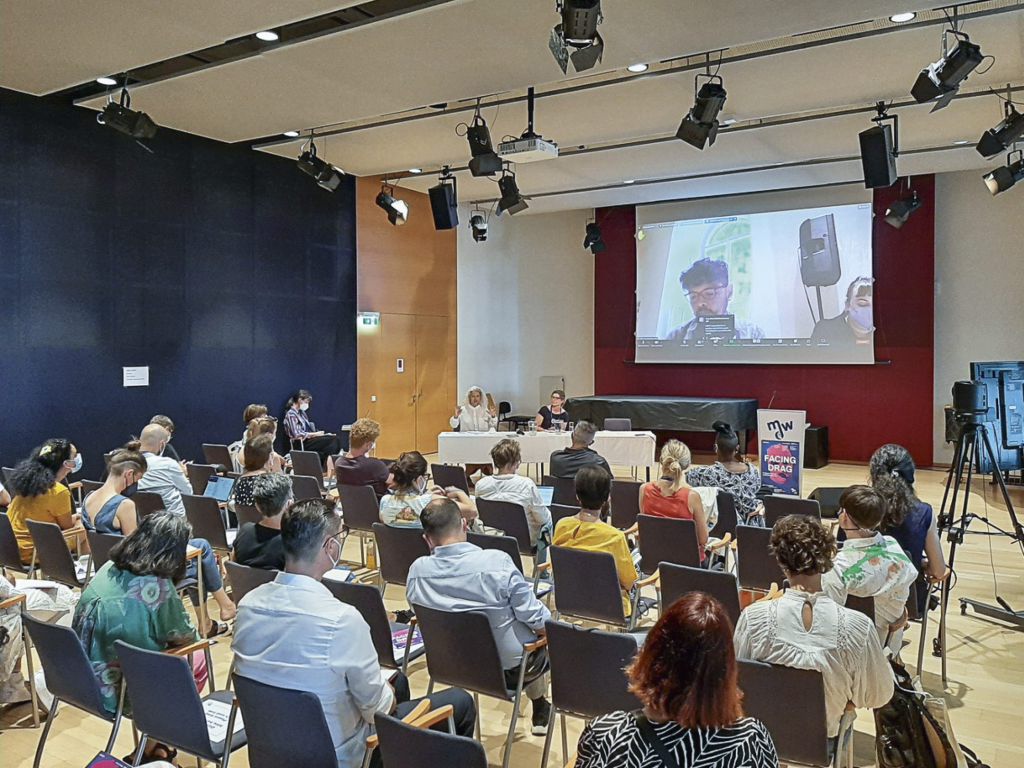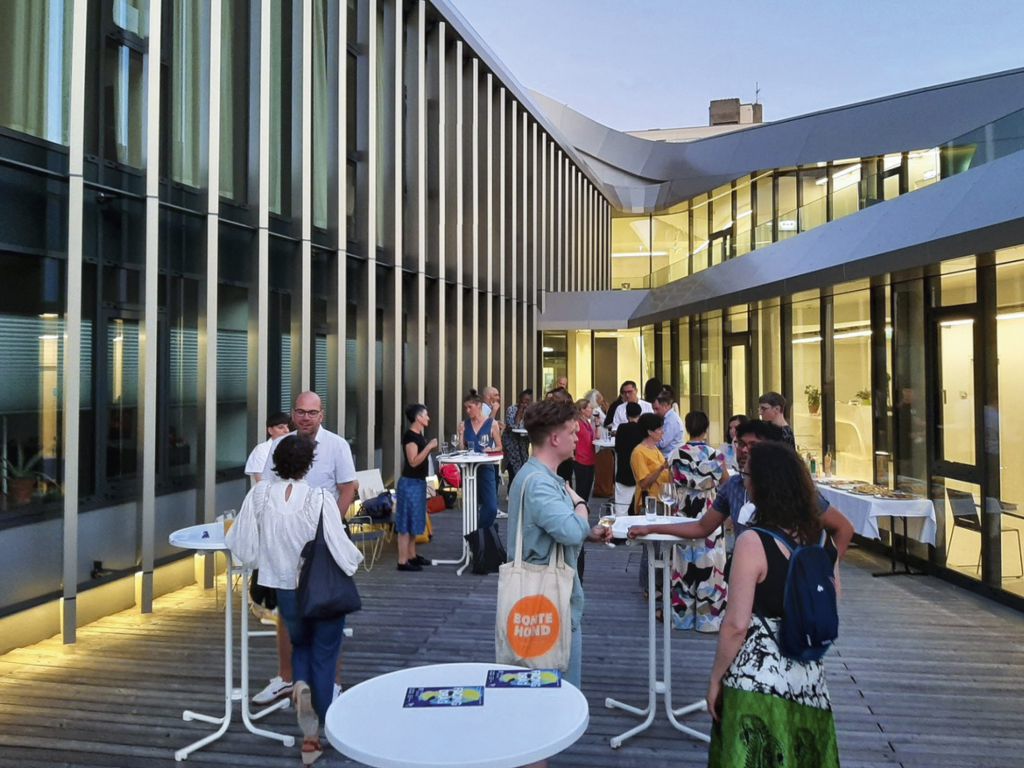From 23 to 25 June, the mdw hosted the conference Facing_Drag with renowned international guests from various fields of cultural studies and from the performing arts, continuing where last year’s online conference left off. This year’s conference, organised by the gender studies team (Evelyn Annuß, Julia Ostwald, and Silke Felber) at IKM, took up drag as a key concept with which to theorise mimetic practices in gender studies and transposed the respective notion of dragging into the context of present-day questions on colonial and racist forms of performative presentation. The conference is part of the efforts to develop an mdw-specific, humanities-based gender studies profile as well as of the current internationalisation strategy of the university. A follow-up conference at the University of Cape Town is planned for the winter semester in 2023/24. During this autumn, a series of film screenings with Fatima Naqvi (Yale), Diedrich Diederichsen (Vienna), and Berlin-based filmmaker Stephan Geene will take place at the Future Art Lab.
Thanks to the Erasmus+ programme, 22 students of theatre studies from the University of Amsterdam were able to attend this year’s conference. They took part in an essay competition won by Nora de Bruine. The following article is based on her text.
Performing Drag: Poetic and Performative Practices in Academic Discourse
During the final days of June, the mdw—located in the middle of Austria’s capital—played host to an international audience of academics, artists and students. The conference Facing_Drag would see them discuss a wide range of topics and concepts centring on the notion of “drag”, which was described by Jay Pather, curator and professor of Performing Arts at the University of Cape Town, as an “act of subversion and transgression” and of “reimagination” in his introductory seminar for students. The concept shifts through different contexts but always denotes a performative cultural utterance that defies power structures, norms, and expectations. Pather described the early motivation to initiate this reimagination in South Africa, where he is based, as a need to undo colonial legacies. Through European projects such as “modernity”, he explained, bodies and cultures were labelled either “cultured” or “primitive” and positioned in a space of disempowerment. The body is thus inherently political, and “dragging” can be viewed as a practice that resists existing power structures and norms.
The following day, keynote speaker Zimitri Erasmus (Johannesburg) introduced her concept of “creolisation” as another counter-mode to thinking in pre-structured categories. Reminiscent of Deleuze and Guattari’s conception of a rhizomatic mode of thought, creolisation moves through categories of race and the post-apartheid era and interrogates, as Jay Pather had previously mentioned, the supposed fixedness of things. Creolisation, according to Erasmus, involves the generative responses that constitute the re-humanisation of people from other parts of the world, previously turned into commodities and inhuman objects under European rule. A striking example of creolisation in action was offered the next day by Nadia Davids (Cape Town), who discussed the concept in relation to the District Six Carnival in Cape Town. She posited that this carnival was a way to mobilise mimicry as a means of survival, reclaim the city centre, and interrogate the merging of different cultures in a divided city, with carnival as a creative and performative utterance of creolisation. As Karin Harrasser (Linz) had previously made clear in her presentation on colonial legacies and Jesuit drag, cultural articulations such as rituals, the performance of music or dance, and the celebration of carnival are an important way to overturn cultural domination. Yet, as Jesuits were attempting to culturally dominate “the other”, they also used music and other forms of artistic education to recompose the body. Education and culture were thus also at the base of appropriation and disciplining. This is why performative utterances that defy norms and power structures are so effective and important. As discussed by the literary scholar Mikhail Bakhtin, carnival—and, with it, other forms of cultural drag—can be viewed as a re-ordering of power structures, as events that are fundamentally about escape and about performing an identity as a way of temporarily feeling a sense of freedom. This is what makes “dragging” such a subversive and transgressive act.

Most striking to me, however, were three talks by artists and scholars Nora Chipaumire (New York/Harare), meLê Yamomo (Amsterdam), and Raz Weiner (London). Besides writing about cultural dragging, they also performed their own theorisations and created near-autopoietic explorations of their own positionalities and practices of drag. meLê Yamomo’s filmic exploration of the connection between sound and body was an example of the use of an artistic medium to convey the message that we expect certain bodies to speak in certain ways, which empowers some and disempowers others. This social dramaturgy, according to Yamomo, is created over centuries and gives rise to questions like “Who is allowed to speak for whom?” and “How does the body process what is being said?” Moreover, the artistic mould into which Yamomo poured his theoretical exploration could also be read as a commentary on academic discourse, begging the question: are we just performing academic drag?

Raz Weiner’s openhearted discussion of his own drag persona and how she enabled him to open up a debate about positionality and identity in a performative manner emphasised once again how performative utterances can be used to rethink and reimagine certain norms and interrogate the concept of identity. But as the performance artist Nora Chipaumire made clear in the discussion after her talk, her artistic work is not about explaining or translating what a body does or making cultures come together. It is not a representation, but rather a presentation of culture, without compromise or a surrendering of values. For her, “dragging” is not about finding a “middle ground”. This conference offered an excellent stepping stone to a rethinking of academic practices, poetic explorations of theoretical discourse, and the importance of positionality and non-neutrality in academic discussions and works.

